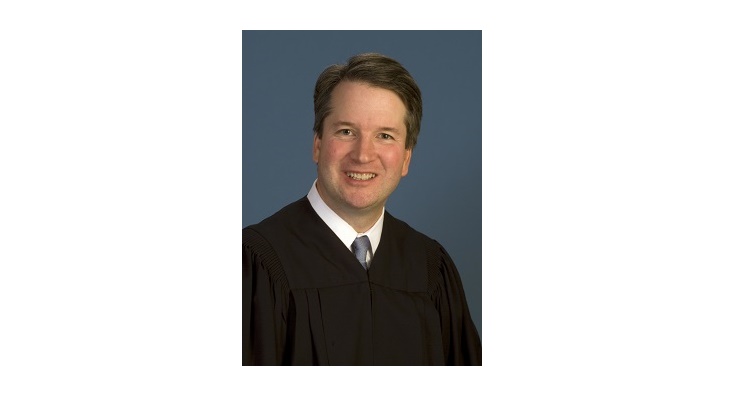
U.S. Supreme Court nominee Brett Kavanaugh goes before the Senate Judiciary Committee on Tuesday as it begins confirmation hearings that President Donald Trump hopes will lead to a solid conservative majority on the nation’s highest court.
The proceedings begin with opening statements from Kavanaugh and committee members.
On Wednesday, Kavanaugh is scheduled to face direct questioning on a range of issues, including his stance on abortion, gay rights and presidential power.
The White House is hoping the full Senate will confirm the 53-year-old Kavanaugh to the nine-member court in September, in time for him to fill the vacancy left by the retirement of Justice Anthony Kennedy when the court opens a new term October 1.
However, Democrats have vowed to fight Kavanaugh’s nomination from the start, fearing his lifetime appointment could ensure a strongly conservative court for a generation.
Democrats will likely try to portray Kavanaugh as someone too tied to President Trump and who will push a conservative agenda on the high court. Republicans are expected to try to paint the nominee as an independent thinker and a principled jurist.
One of the main issues Kavanaugh will be questioned on is the Supreme Court’s landmark 1973 Roe v. Wade case, which gave women the right to have an abortion.
Kavanaugh, who has championed pro-life views, has not said whether he believes the case was decided correctly, and he is not likely to do so during the hearings.
Another key issue at the hearings will be Kavanaugh’s views on executive authority. Kavanaugh has argued that presidents should be free from civil lawsuits, criminal prosecutions and investigations while in office. His view was shaped by his own involvement with a presidential investigation when he worked for independent counsel Ken Starr in his investigation of President Bill Clinton in the late 1990s.
The matter could be significant to Trump if the high court is called upon to render judgment on matters arising from special counsel Robert Mueller’s ongoing Russia-related investigation into the Trump administration and several civil lawsuits pending against Trump.
Kavanaugh will also likely face tough questioning on environmental controls, affirmative action, and the conflict between religious beliefs and gay rights.
Randy Barnett, a constitutional law professor at Georgetown University, told VOA it will not be clear exactly how Kavanaugh would rule on certain issues, and that he thinks it is right to not have those positions spelled out in advance.
“This is exactly the reason why judges don’t talk about how they’re going to rule on cases because until the case is in front of them and been argued by both sides, they may not know how they’re going to rule,” he said. “We don’t want judges in their confirmation hearings to commit themselves in such a way as they will then be disqualified from actually ruling impartially when the case comes before them.”
Kavanaugh’s record of court opinions shows he is a conservative thinker opposed to abortion and supportive of corporations against government regulation. He is a Catholic who has the backing of evangelical Christian groups.
Most independent Supreme Court analysts are predicting, based on hundreds of decisions that Kavanaugh has written at the appellate court level, that Kavanaugh, if confirmed, would most often side with the conservatives, rather than prove to be the swing vote that Kennedy often provided on key issues favoring liberal interpretations of U.S. law.
The eight sitting justices are evenly split between liberals and conservatives.
Close vote expected
The eventual full Senate vote on Kavanaugh is expected to be close, with Republicans holding a narrow 50-49 majority with the death of Republican Senator John McCain of Arizona. But Arizona Governor Doug Ducey is required by state law to name another Republican to replace McCain and says he expects to do so in the coming days.
If all 51 Republicans support Kavanaugh, he would become the court’s 114th justice. At the moment, no Republicans have said they will reject Kavanaugh’s nomination and no Democrats have said they will support it.
Democrats are expected to vote overwhelmingly against Kavanaugh’s nomination, although three Democratic senators who voted for Trump’s first high court nominee, Neil Gorsuch, have yet to voice opposition or support for Kavanaugh, pending the confirmation hearing.
Democratic Senators Joe Donnelly in Indiana, Heidi Heitkamp in North Dakota and Joe Manchin in West Virginia all face tough re-election battles in November in states Trump won easily in the 2016 election and could face pressure from voters to approve the Trump court selection.
Key records
Kavanaugh has had a long career in Washington that spans work two decades ago on the impeachment investigation of former President Clinton, as a White House aide to former President George W. Bush, and most recently 12 years on the U.S. District Court of Appeals in Washington, a court often considered a stepping-stone to a Supreme Court seat.
Democrats opposed to Kavanaugh’s nomination have complained that Republicans supporting him are withholding key records from Kavanaugh’s time as Bush’s staff secretary, which they wanted to use as a basis to question him.
The Judiciary Committee has received 415,000 pages of documents about the Supreme Court nominee’s time in the Bush White House, of which 147,000 are being withheld from public release. In addition, Trump officials say they will not release 101,921 pages of Kavanaugh-related records to the panel because of the sensitivity of the communications.
Senate Democratic Leader Chuck Schumer said on Twitter late Monday the Senate was given 42,000 pages of documents, but that the collection was impossibly large to review before the hearing began Tuesday.
“This just underscores how absurd this process it,” Schumer said.
A committee Twitter account run by the Republican majority dismissed Schumer’s criticisms, saying Republicans had reviewed every page and were ready for the confirmation process to begin.
Leave a Reply